News & Media
RDP of the soul: Recentring the church’s role in society
On 20 May 2025, as part of the Unisa Research and Innovation Week, the Chief Albert Luthuli Research Chair hosted a symposium titled "The RDP of the soul". The engagement focused on the role of the church in attending to the myriad ills confronting South Africa and the rest of the world. The discussions highlighted the stark contradictions of a country rich in resources yet plagued by economic insecurities. The speakers highlighted how the nation is at a critical crossroads, grappling with the ramifications of historical injustices and present-day vulnerabilities. The audience was urged to ask the question: Where is the church, and why is the church silent?
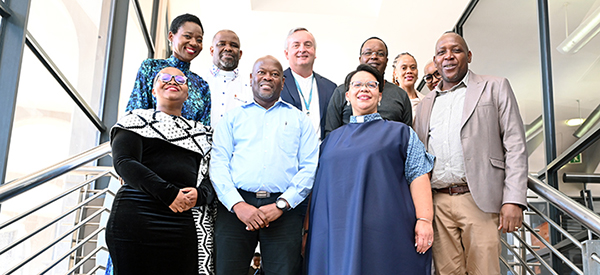
Front, from left: Prof Fundiswa Kobo, Prof Mokhele Madise, Rev Heidi Petersen and Prof Thinandavha Mashao
Back, from left: Prof Puleng Segalo, Rev Mzwandile Molo, Prof Wessel Bentley, Prof Bosire Onyancha, Dr Tinyiko Chauke and Lesego Linda Plank
The opening and welcoming remarks by Prof Thinandavha Mashao and Prof Puleng Segalo set a poignant tone for the day’s conversations. Mashao urged attendees to contemplate the fragility of South Africa’s democracy and the moral failures of its institutions, particularly as they affect the most marginalised among its citizens. The mention of cases like the Omotoso scandal starkly illuminated the urgent need for accountability and protection of the vulnerable against human trafficking and abuse. Acknowledging the legacy of Chief Albert Luthuli and other freedom fighters, the audience was reminded of the importance of sharing their stories in the quest for justice and liberation. The invocation of their struggles encouraged the audience to consider how their sacrifices laid the groundwork for the current dialogues about equality and dignity.
As the programme unfolded, the spotlight shifted to Segalo, who elegantly articulated the significance of the symposium. Her acknowledgement of Africa Month framed discussions within a broader historical context that resonated with the collective aspirations of the continent and the institution.
Reflecting on the establishment of the African Union, Segalo challenged the audience to envision a united Africa, a continent where solidarity prevails, transcending individual national boundaries. The beauty of the symposium lay in its collective inquiry: Are we truly working towards the vision set forth by Africa's leaders in 1963?
"While we celebrate our achievements," said Segalo, "we must also confront the ongoing struggles that threaten our shared futures. Are we, as a continent, ready to break free from the remnants of colonialism, both in spirit and practice?"
In this spirit of reflection, the audience was prompted to engage critically not only with the successes of the past but also with the challenges that plague the present. As their thoughts lingered on these questions, it became increasingly clear that the path forward is not one of isolation but of connectedness, solidarity and a renewed commitment to justice.
Each speaker, audience member and conversation at the symposium contributed to a growing tapestry of hope and action, and served as a reminder that the quest for a more equitable society is a collective journey. Rev Mzwandile Molo, the General Secretary of the South African Council of Churches (SACC), acknowledged that the prophetic voice of the church has either been silenced or lost. However, he was curious about the nature of the church, as it appears that there are bystanders in this conversation who are constantly asking about the visibility of the church, as if they are not a part of the church. For Molo, the church is everywhere and in everyone. In attempting to radicalise the pulpit, Prof Mokhele Madise left the audience with a moving remark: "Maybe it is time we dismantled the 'traditional pulpit' so that the church leaders are right in the centre among the people and not detached from the everyday realities and voices of the people." This provocation could remove the church from a monologue pulpit towards a more radical, decolonised and dialogical pulpit.
The audience found themselves mesmerised by Prof Fundiswa Kobo, who reminded them of the importance of Amanyano or church fellowships by echoing and chanting one of iNkosi Albert Luthuli’s favourite hymns – Mangisondele Nkosi Kuwe Manje (Let me draw closer to you, God). Kobo emphasised that this song is a prayer and lamentation to God, as the Manyano members have allowed Amanyano to be institutionalised. This act has led to them losing their essence. Through her use of a womanist feministic background, it was evident that there is a great need for the Manyanos to once again be free from theological captivity. Kobo’s provocation, Mangisondele Nkosi Kuwe Manje, is not only a hymn, but a protest, a prayer and an understanding that justice will prevail.
Rev Heidi Petersen was the fourth speaker, and in her conversation reminded the audience that "neutrality is a luxury we cannot afford, as we need to be decisive about our position with the injustices we are facing in our country and also in the church". Petersen presented Segalo with a personalised candle with the image of Chief Albert Luthuli as a significant symbol of light and hope. The gesture is not only a token of gratitude but rather a representation of light, and serves as a reminder to Segalo to persist in her rejection of neutrality and silence.
Prof Wessel Bentley, the fifth and final speaker of the day, questioned whether the church has been forgotten or lost in the past 30 years of democracy. He urged the church to remain vigilant in its engagement with communities, as it is a matter of justice, not pity. Bentley continued to argue that the church is in dire need of a prophetic space of love, ubuntu and servant leadership.
In her concluding remarks, the programme facilitator, Lesego Linda Plank, posited that participants should depart from the 2025 Chief Albert Luthuli Research Chair symposium energised by the presenters and discussions. "It is imperative to be deliberate in our pursuit of reclaiming the RDP of the soul and elevating the prophetic voice," she said. "As the church strives to remain relevant in a rapidly shifting social context, it must engage in a critical reassessment of its mission. A renewed commitment to social justice principles is critical for adapting to contemporary challenges while nurturing future leaders equipped to confront injustices."
The symposium illuminated the necessity of collaboration in addressing the multifaceted needs of communities. The concept of the RDP of the soul serves as a profound reminder that collective efforts can indeed engender transformative change, fostering inclusive environments where individuals can thrive.
The speakers urged participants to carry forward the insights gleaned from the gathering into their daily lives, recognising the shared power they hold in ensuring that every voice is not only heard but also respected.
The message was clear: As we confront the complexities of our times, may we remain resolute in our commitment to unmask societal truths and advocate for healing and liberation for those who are marginalised.
* By Lesego Linda Plank and Dr Tinyiko Chauke, Chief Albert Luthuli Research Chair
Publish date: 2025-06-05 00:00:00.0


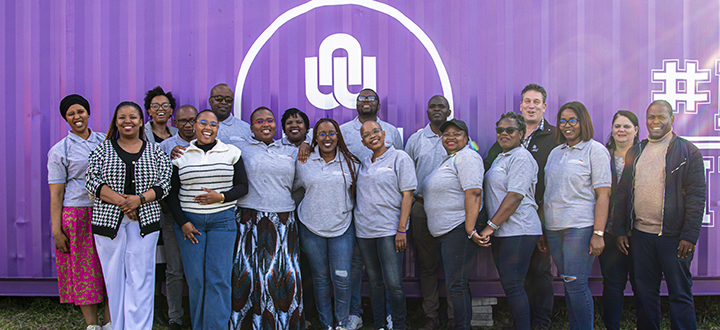 A giant leap for student success and retention
A giant leap for student success and retention
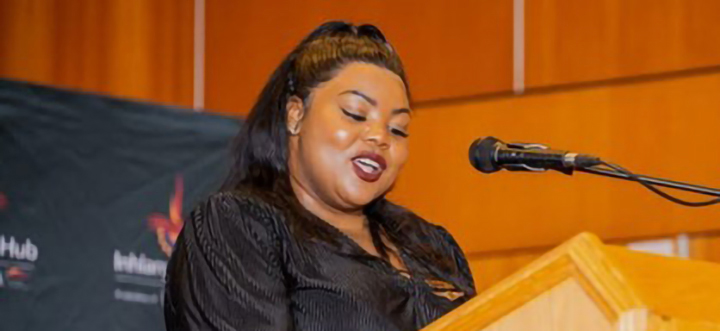 SWEEP: Where women entrepreneurs take the lead
SWEEP: Where women entrepreneurs take the lead
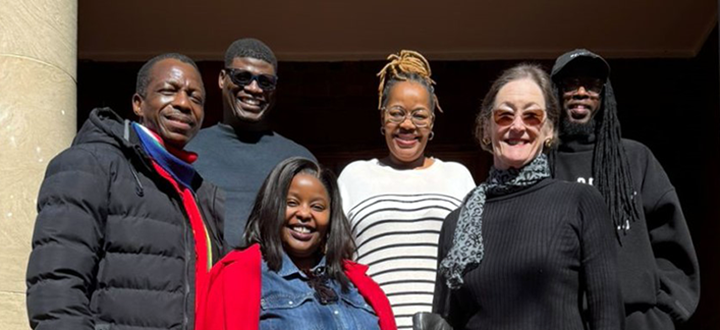 A sense of belonging and excellence nurtured through collaboration
A sense of belonging and excellence nurtured through collaboration
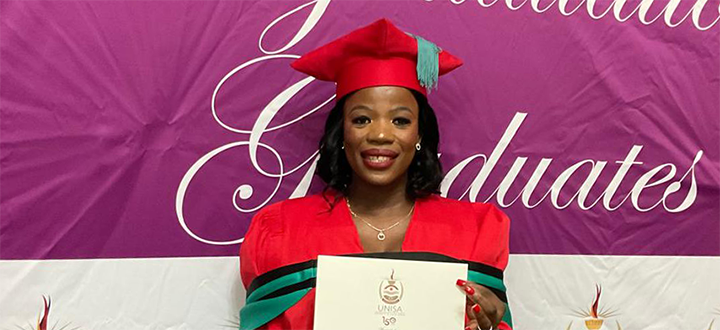 Wielding her Unisa PhD, Botswana educator champions early childhood development
Wielding her Unisa PhD, Botswana educator champions early childhood development
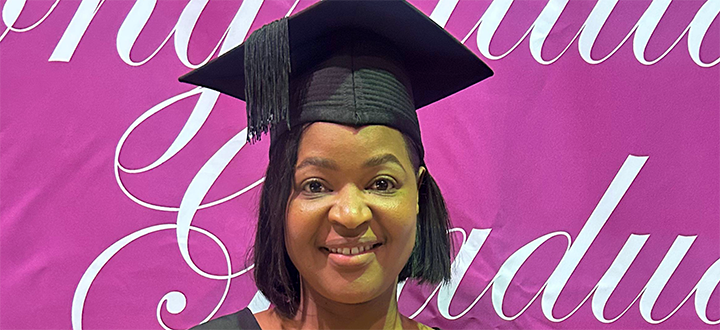 Proud Unisa alumna bridges distance and fuels career growth
Proud Unisa alumna bridges distance and fuels career growth